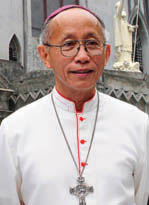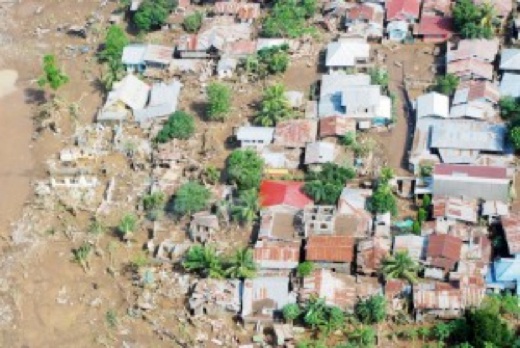The Archbishop of Cagayan de Oro in northern Mindanao, Philippines, Antonio J Ledesma SJ, has called for environmental protection and good governance to be part of the post disaster response in Mindanao. He did so in his homily at the opening of a forum for Bishops and Diocesan Clergy of Mindanao on the challenges of Tropical Storm Washi (Sendong in the Philippines) for Mindanao in February.
Archbishop Ledesma spoke of three major concerns the Archdiocese is addressing, the first of which is the ongoing relief and rehabilitation efforts for the evacuee families whose homes and livelihoods were destroyed by the widespread flash floods caused by Tropical Storm Washi in December 2011.
He said about 1,400 families have moved to transitory shelter sites, another 1,800 families are still in two public school buildings, several barangay covered courts, and two church halls, and many others are in temporary shelters such as tents, bunkhouses, and locally made huts.
Although work to provide permanent housing (including Xavier University’s Xavier Ecoville) for about 1,500 families has begun, more sites and housing are needed for the remaining 3,000-4,000 families whose houses were washed away.
The families are also receiving post-trauma counselling and health checks. Parish priests and ministry workers of the Archdiocese have also scheduled regular religious services and catechetical programs for Catholics, alongside activities of other denominations.
The next major concern is the need to protect and preserve the natural environment.

The Archbishop also urged support for the implementation of a total logging ban and a moratorium on mining activities that disturb the topsoil, saying irreversible damage has already been done to the environment by extractive activities.
“It is unconscionable for city officials to adopt a business-as-usual attitude for mining permits to continue. At the very least, multi-sectoral monitoring teams should be allowed to verify on the ground the effects of these mining activities – whether small-scale or large-scale,” declared Archbishop Ledesma, adding that “it is the mining firms that have the burden of proof in showing that their activities are not detrimental to the common good.”
The third major concern is good governance, which he sees as understood in terms of an active and participatory citizenry on the one hand and a responsive government on the other hand.

“The preoccupation with political party affiliations restricted the offer of more assistance to the affected communities,” he said.
The Archbishop also pointed out that disaster preparedness and long-term city planning could have mitigated the dire consequences of allowing households to stay along the river’s own waterways.
Archbishop Ledesma concluded his homily by encouraging the laity including Catholic religious lay organisations “to form widening circles of discernment to discuss, pray over, and address together these pending issues that involve environmental justice and the common good as well as the sustainable development of our city. Following the legacy of St Augustine, patron of the city and the archdiocese of Cagayan de Oro, the City of Man has to be built in consonance with the moral principles of the City of God.”
To read the full homily, click here.
Xavier Ecoville is a relocation and resettlement project in Lumbia that Xavier University and the City Government of Cagayan de Oro are jointly developing. It broke ground on March 3. The construction of the houses will be managed in conjunction with Habitat for Humanity Philippines according to the memorandum of agreement signed that day. For an update on Xavier University’s permanent housing project for evacuee families, click here.






